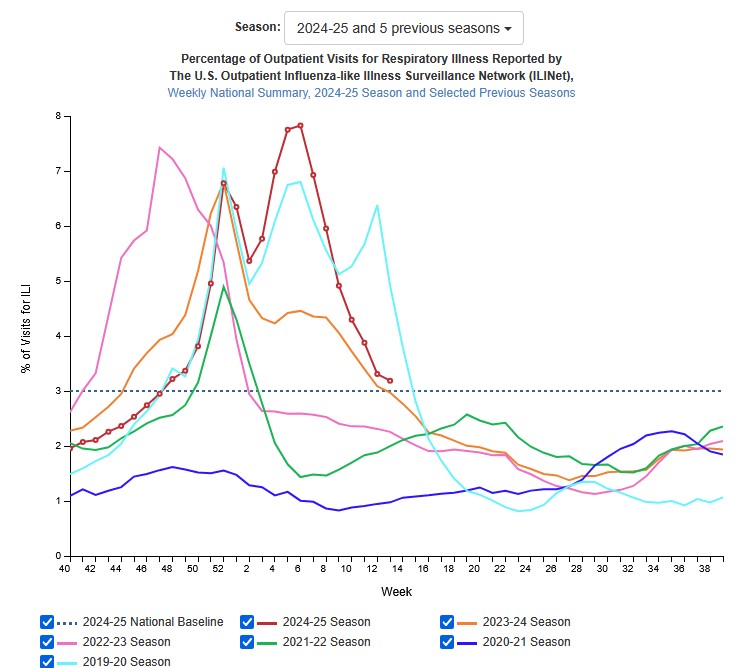 For the seventh week in a row, indicators show that US influenza activity is dropping, but it's still above baseline levels and has been for 18 straight weeks, and flu-related pediatric deaths have reached 168, the Centers for Disease Control and Prevention (CDC) said today in its weekly update.
For the seventh week in a row, indicators show that US influenza activity is dropping, but it's still above baseline levels and has been for 18 straight weeks, and flu-related pediatric deaths have reached 168, the Centers for Disease Control and Prevention (CDC) said today in its weekly update.
"Seasonal influenza (flu) activity continues to decline; however, CDC expects several more weeks of flu activity," the CDC said.
The percentage of outpatient visits for influenza-like illness, or respiratory illness, dropped from 3.3% the previous week to 3.2% last week but is still above the national baseline of 3.0% (see CDC graph above). As in the previous week, five US regions are below their baseline levels.
Only 2 jurisdictions are reporting high or very high flu activity, a sharp drop from 7 the previous week. Test positivity for flu is now at 9.7%, down from 10.7%. Hospitalizations and deaths are both down, but the cumulative hospitalization rate for this season is the highest since the 2010-11 season.
Nine new pediatric flu deaths bring the season's total to 168, the CDC said. That compares with 187 and 207 deaths for the previous two flu seasons. Seven of the new deaths were from influenza A and two from influenza B.
Low levels of flu, COVID, RSV in wastewater
Meanwhile, COVID-19 levels also continue to decline from already low levels, according to the CDC's latest data updates today. Wastewater detections last week remained low, with the highest levels in parts of the South. The rate of overall deaths that were caused by COVID last week was 0.8% (down slightly from 0.9%), similar to the 0.9% for flu.
In its update on the three leading respiratory illnesses—flu, COVID, and respiratory syncytial virus (RSV) —the CDC that, nationally, flu (9.7%), and RSV (4.1%) test positivity decreased from the previous week, while COVID-19 (3.7%) remained stable. Wastewater levels for influenza A are low, while for RSV they are now very low.












